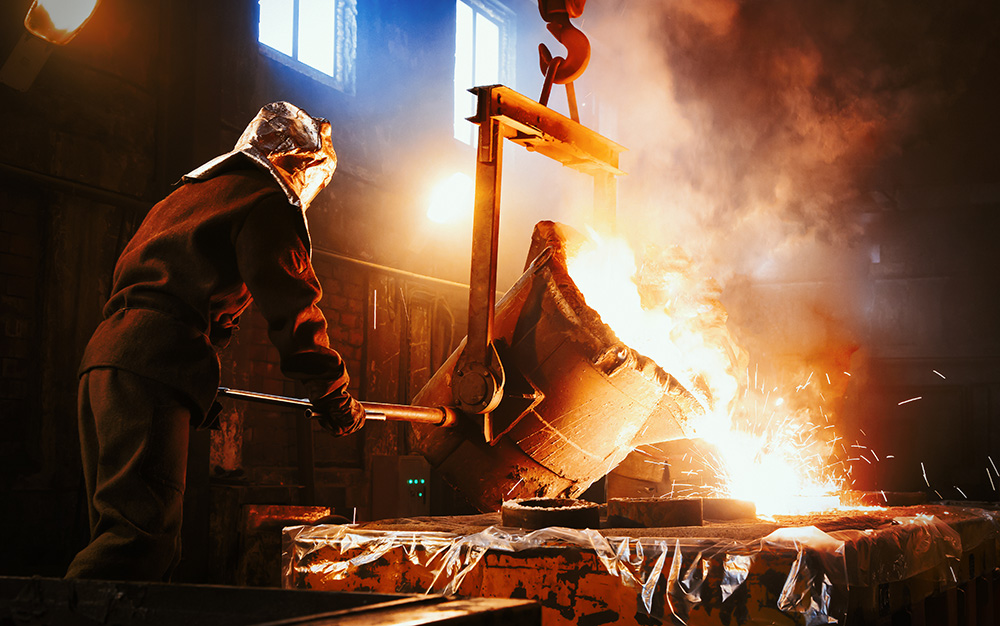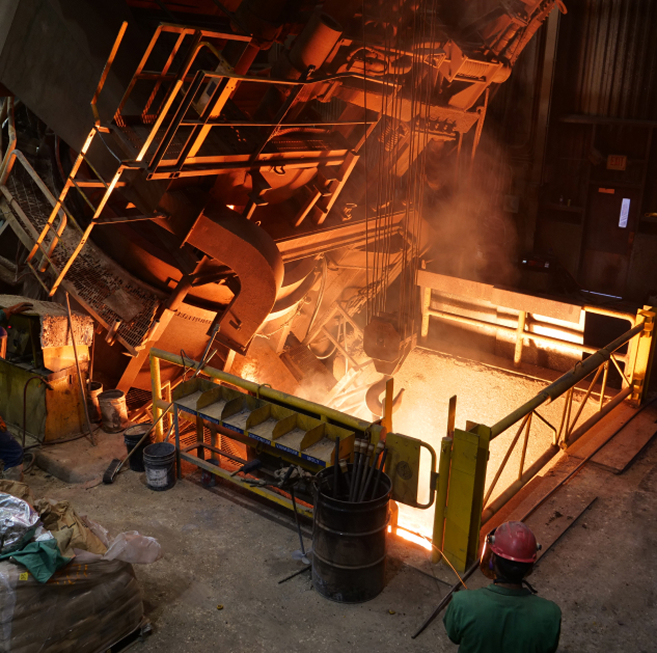Key strengths of choosing a professional Aluminum Foundry for your next project
Exactly How a Metal Foundry Adds To Lasting Metal Manufacturing Practices
Metal foundries play an essential function in advertising sustainability within the metal manufacturing industry. By including recycled products, they decrease dependence on virgin resources and decrease ecological impacts. Energy-efficient melting processes better reduce power usage and exhausts. However, the trip toward lasting techniques involves more than just recycling and power monitoring. It includes a more comprehensive dedication to ethical sourcing and innovative technologies. The effects of these practices are substantial and warrant more detailed exam.
The Duty of Recycling in Metal Foundries
While metal manufacturing has typically counted on virgin products, the raising emphasis on sustainability has actually brought about a considerable change in methods, specifically in metal foundries. Recycling has actually emerged as a crucial element of this makeover, allowing foundries to repurpose scrap metal and lower reliance on extracted sources. By incorporating recycled materials right into their procedures, foundries not just reduce environmental effect yet additionally reduced manufacturing prices.
Using recycled metals, such as copper, aluminum, and steel, lessens energy consumption and minimizes greenhouse gas emissions related to conventional mining and refining approaches. Foundries can attain high-quality outputs by utilizing advanced sorting and handling innovations to guarantee the pureness of recycled products. This focus on reusing fosters a circular economy, where waste is minimized, and sources are utilized efficiently. Metal foundries play a critical function in promoting lasting techniques within the metal manufacturing industry.
Energy-Efficient Melting Methods
Energy-efficient melting techniques are essential for boosting sustainability in metal production. These strategies considerably reduce power consumption during the melting procedure, which is just one of one of the most energy-intensive phases in metal manufacturing. Technologies such as induction melting, resistance home heating, and microwave melting deal improved effectiveness contrasted to typical approaches. Induction melting, for example, makes use of magnetic fields to generate warmth straight within the metal, minimizing energy loss and providing exact temperature level control.
In addition, carrying out warmth recuperation systems can further enhance performance by recording and reusing waste warm generated during melting. Using innovative insulation products and optimizing heating system styles additionally add to energy cost savings. By embracing these cutting-edge melting strategies, metal foundries can decrease their carbon footprint, minimize operational costs, and contribute to a more lasting production landscape. The assimilation of energy-efficient methods not only aligns with ecological goals yet likewise fulfills the expanding demand for accountable manufacturing approaches in the metal sector.
Lasting Sourcing of Raw Products
Lasting sourcing of raw products is necessary for decreasing the ecological influence of metal production. This entails the increased use of recycled metals, the adoption of moral mining methods, and initiatives targeted at local sourcing. By focusing on these techniques, the industry can advertise liable source monitoring and assistance neighborhood economic climates.

Recycled Metal Application
Exactly how can markets properly minimize their ecological impact while fulfilling the growing need for metal? One considerable technique is the application of recycled metal. By incorporating scrap metal right into their manufacturing processes, foundries can lower the extraction of virgin products, therefore lowering and preserving natural resources power intake. Recycled metals call for much less power to process contrasted to their raw counterparts, causing reduced greenhouse gas emissions. Furthermore, using recycled metal aids divert waste from garbage dumps, promoting a circular economic situation. Industries that focus on recycled metal not just contribute to sustainability but also gain from cost savings associated with reduced material purchase. Recycled metal utilization stands as a necessary strategy for ecologically responsible metal manufacturing.
Ethical Mining Practices
While the demand for steels remains to climb, sectors are increasingly acknowledging the significance of moral mining practices in making sure liable sourcing of resources. Ethical mining encompasses a dedication to environmental stewardship, social responsibility, and adherence to reasonable labor techniques. Firms are now prioritizing partnerships with mines that show transparency in their operations, lessening ecological influence and appreciating neighborhood communities. This method not just cultivates a sustainable supply chain but additionally boosts the credibility of businesses included. By implementing extensive requirements and qualifications, markets can fight illegal mining tasks and advertise the well-being of workers. Inevitably, ethical mining methods add considerably to an extra sustainable metal production community, aligning economic development with social and ecological honesty.
Local Sourcing Initiatives

Developments in Metal Casting Processes
Technologies in metal casting processes are transforming the sector by integrating innovative recycling strategies that decrease waste. Energy-efficient melting techniques are additionally being created to decrease energy usage throughout production. Additionally, making use of innovative mold materials adds to boosted efficiency and sustainability in casting operations.
Advanced Recycling Techniques
Advanced recycling methods are changing metal casting procedures, substantially boosting sustainability in the market. These advancements concentrate on recycling and reclaiming scrap metal, substantially decreasing waste and the need for virgin products. Methods such as hydrometallurgy and pyrometallurgy make it possible for foundries to extract useful metals from utilized components, making certain effective resource use. Furthermore, advanced sorting and purification modern technologies enhance the high quality of recycled steels, making them appropriate for high-performance applications. This not just minimizes the ecological footprint of metal production yet likewise cultivates a round economic climate by promoting the reuse of products. As these reusing methods proceed to evolve, they guarantee to better improve operations within foundries and add to an extra sustainable metal manufacturing landscape.
Energy-Efficient Melting Approaches
While standard melting methods have long been the foundation of metal casting, current innovations have actually introduced energy-efficient strategies that substantially reduce energy consumption and exhausts. Technologies such as induction melting and electric arc heating systems have obtained importance, permitting exact control over temperature and decreasing the need for fossil gas. These approaches not only boost power performance but also promote quicker melting times, which equates to lower functional prices. In addition, innovations in heat recuperation systems make it possible for foundries to capture and reuse excess warmth created during the melting process. This all natural technique i loved this to energy administration not just sustains sustainable practices however additionally settings metal foundries as leaders in the change in the direction of greener production processes, better lining up with international sustainability objectives.
Cutting-edge Mold Products
As the demand for more sustainable and efficient metal casting processes grows, the exploration of ingenious mold products has actually ended up being a focal factor in the market. Traditional mold and mildew materials often add to ecological difficulties, triggering the look for alternatives that lower waste and power usage. Current advancements include the development of naturally degradable binders and recyclable composites, which not only enhance mold efficiency however additionally minimize ecological effect. Additionally, the usage of 3D printing technology in mold development permits elaborate designs that reduce product use and enable rapid prototyping. These ingenious materials not just improve casting accuracy yet also straighten with sustainability objectives, showcasing the industry's dedication to decreasing its carbon footprint while preserving premium manufacturing standards.
Reducing Waste Through Advanced Technology
Innovative technologies are changing the metal production sector by considerably reducing waste and boosting efficiency. Advanced information analytics and artificial intelligence formulas enable foundries to enhance production processes, recognizing ineffectiveness and reducing scrap material. Smart sensors check equipment performance in real-time, enabling anticipating upkeep that lowers downtime and waste generation. Furthermore, additive production strategies, such as 3D printing, permit the creation of complicated elements with very little material usage, substantially decreasing waste contrasted to standard techniques.
In addition, closed-loop systems are ending up being extra widespread, in which scrap metal and byproducts are recycled back right into the production cycle, making certain that products are utilized to their greatest capacity - Aluminum Foundry. This combination of technology not only promotes resource conservation but likewise improves the general sustainability of metal manufacturing methods. By accepting these developments, foundries can add to an extra lasting future while keeping competitiveness in the marketplace
The Influence of Foundries on Carbon Footprint Reduction
Foundries play a vital role in decreasing the carbon footprint of the metal manufacturing market by executing numerous lasting methods. By utilizing energy-efficient innovations, such as electric arc heating systems, these facilities substantially reduced greenhouse gas exhausts contrasted to conventional approaches. Furthermore, foundries significantly embrace renewable resource resources, which also diminishes their reliance on nonrenewable fuel sources.
Reusing scrap metal is an additional crucial technique that foundries utilize, saving resources and minimizing the demand for virgin materials. This not just reduces waste but also lowers the energy-intensive extraction procedures connected with pop over to this web-site mining. The adoption of closed-loop water systems helps to minimize water use and reduce wastewater discharge, contributing to a much more lasting operation.
Via these initiatives, foundries demonstrate their dedication to ecological stewardship, resulting in a marked reduction in the overall carbon impact of the metal production sector. Their recurring initiatives are essential in the shift toward an extra lasting industrial landscape.
Regularly Asked Inquiries
What Kinds of Metals Are Most Typically Recycled in Foundries?
Aluminum, brass, copper, and steel are among the most frequently recycled metals in foundries. These steels are preferred as a result of their high recycling rates, financial value, and extensive schedule, adding considerably to commercial sustainability initiatives.
How Do Foundries Make Certain the Quality of Recycled Products?
Foundries determine the top quality of recycled products with rigorous screening, sorting, and purification processes. They execute advanced modern technologies to evaluate structure and remove contaminations, assuring that the recycled metals satisfy industry criteria for performance and security.
What Certifications Exist for Sustainable Foundry Practices?
Various certifications exist for lasting foundry methods, including ISO 14001 for environmental management, ISO 50001 for energy monitoring, and LEED accreditation for lasting structure practices (Metal Foundry). These qualifications help assure adherence to environmental and sustainability criteria in procedures
Exactly How Do Foundries Determine Their Carbon Impact Reduction?
Foundries determine carbon footprint decrease through devices like lifecycle analyses, power audits, and exhausts tracking systems. They contrast standard discharges to current outputs, reviewing enhancements in energy performance, product usage, and sustainable power adoption gradually.
What Are the Economic Benefits of Lasting Metal Production?
Lasting metal production offers financial benefits such as decreased functional prices, boosted effectiveness, boosted market competitiveness, and prospective government rewards. Additionally, it cultivates innovation and attracts environmentally conscious customers, eventually driving lasting earnings for companies.
Metal foundries play a vital function in advertising sustainability within the metal production sector. While metal production has traditionally counted on link virgin products, the raising emphasis on sustainability has led to a substantial change in techniques, specifically in metal foundries. By incorporating scrap metal right into their manufacturing processes, foundries can reduce the removal of virgin products, consequently minimizing and conserving natural sources power consumption. Foundries play a vital function in decreasing the carbon impact of the metal production sector by executing different sustainable methods. Recycling scrap metal is another essential practice that foundries utilize, conserving sources and minimizing the need for virgin materials.